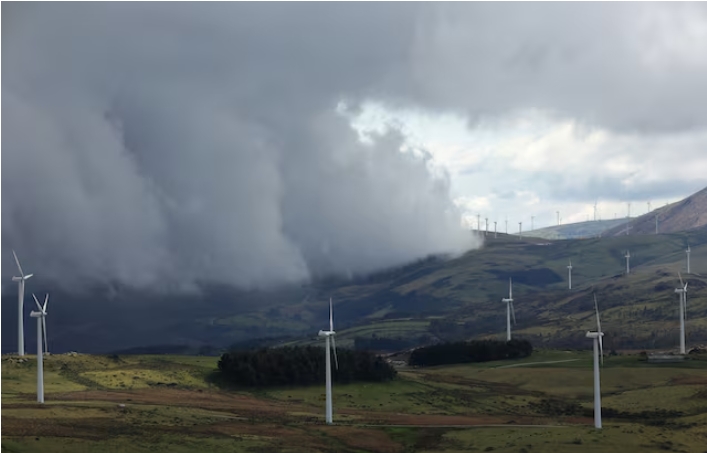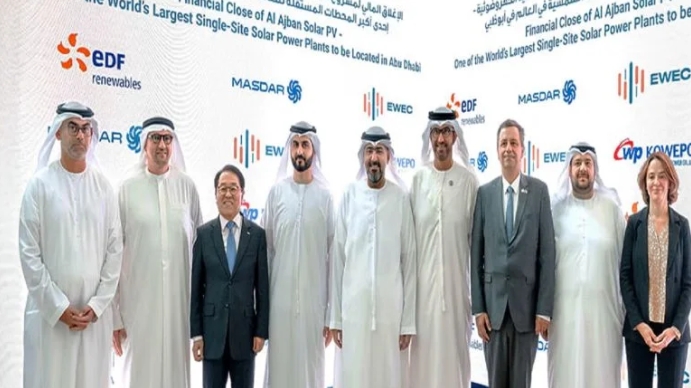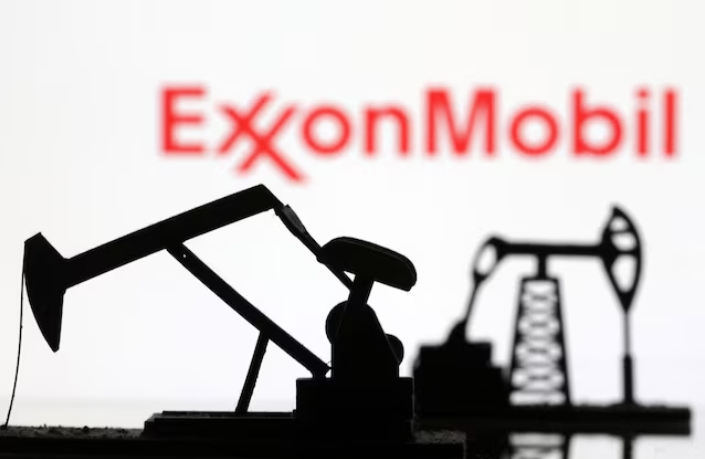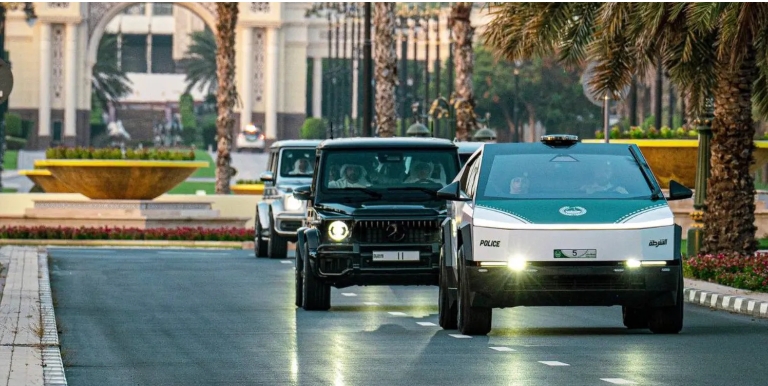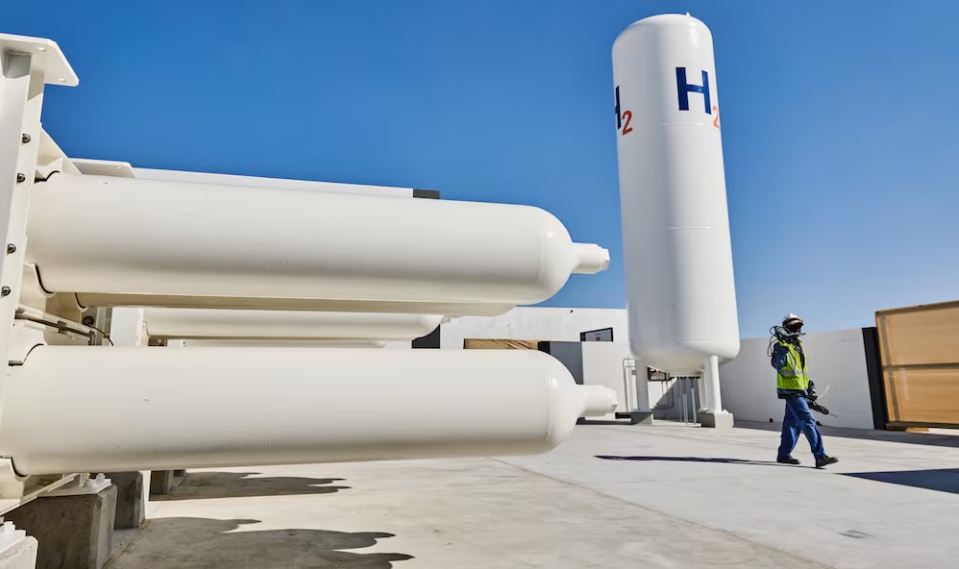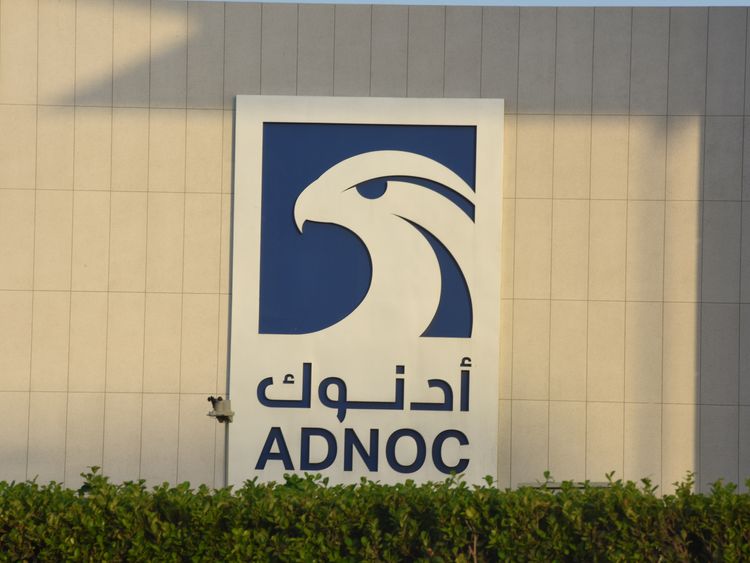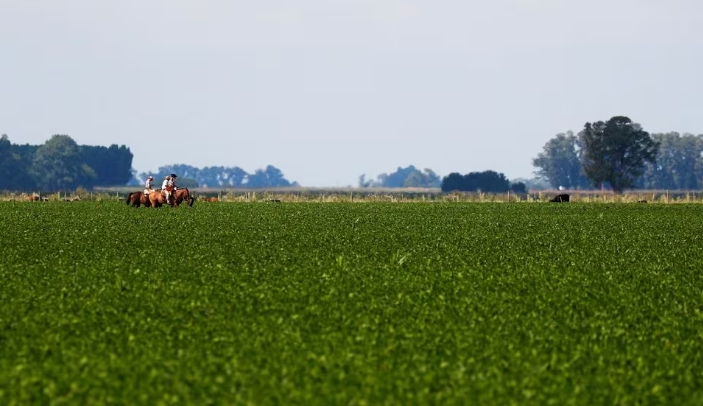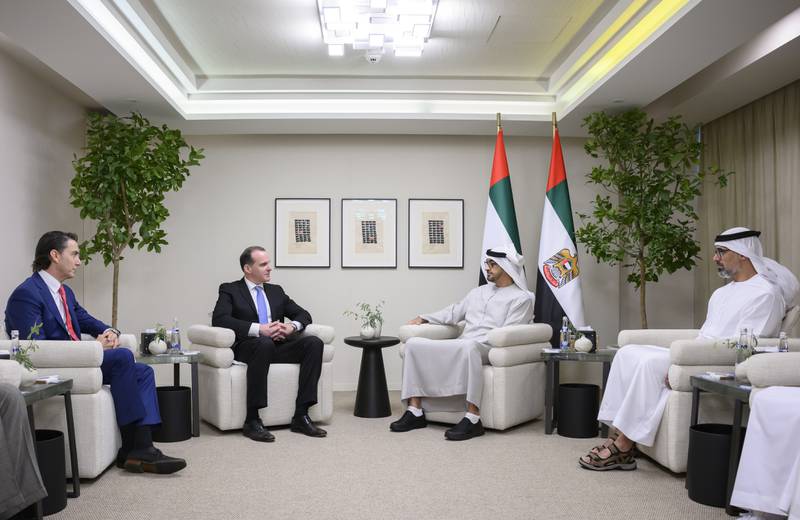 President Sheikh Mohamed meets Brett McGurk, deputy assistant to the US President, second left, during Adipec in Abu Dhabi. Also present were Sheikh Khaled bin Mohamed, Member of Abu Dhabi Executive Council and Chairman of Abu Dhabi Executive Office, right, and Amos Hochstein, US special presidential co-ordinator, left.
President Sheikh Mohamed meets Brett McGurk, deputy assistant to the US President, second left, during Adipec in Abu Dhabi. Also present were Sheikh Khaled bin Mohamed, Member of Abu Dhabi Executive Council and Chairman of Abu Dhabi Executive Office, right, and Amos Hochstein, US special presidential co-ordinator, left.
The UAE and the US signed a strategic partnership to invest $100 billion to produce 100 gigawatts of clean energy globally by 2035.
The agreement was signed at the Abu Dhabi International Petroleum Exhibition and Conference (Adipec) in the presence of UAE President Sheikh Mohamed, state news agency Wam reported on Tuesday.
Dr Sultan Al Jaber, Minister of Industry and Advanced Technology, and Special Envoy for Climate Change, and Special Presidential Co-ordinator Amos Hochstein signed the partnership on behalf of the UAE and the US, respectively.
“The energy transition needs a realistic, practical and economically viable plan to deliver climate progress, together with energy security and inclusive economic growth,” Dr Al Jaber said.
“The UAE-US Partnership for Accelerating Clean Energy [Pace] will enable climate action while enhancing global energy security and affordability for the people of the UAE, the US and nations around the world.”
At the event in Abu Dhabi, the UAE and the US reaffirmed their shared commitment to enhancing their climate ambitions and action, in line with their goals of achieving net zero emissions by 2050.
Both countries also recognised that a rapid, sustainable and well-managed energy transition is critical to successful climate action, as well as to enhancing global energy security and affordability, Wam reported.
“Our new Partnership for Accelerating Clean Energy will catalyse $100bn in clean energy financing in both countries, as well as robust commercial investment and other support for the emerging economies whose clean development is both underfunded and essential to the global climate effort,” the White House said separately.
The two nations will also invest in the management of harmful emissions such as carbon dioxide and methane, the development of advanced nuclear technology and the decarbonisation of the industrial and transport sectors.
US President Joe Biden thanked Sheikh Mohamed for his leadership in “advancing the initiative and for hosting Cop28 next year”.
“This is just the latest demonstration of the deep strategic relationship our countries share and of the broader US commitment to promoting economic prosperity, security and stability in the Middle East region,” the White House statement said.
As part of the partnership, the US and the UAE will set up an expert group to identify priority projects, remove potential hurdles and measure Pace’s progress in achieving its targets.
They will also seek to “bridge the gap between developed and developing countries in the investment in and deployment of clean energy to ensure global efforts to reduce emissions do not falter”, the White House said.
The two countries will work together to prioritise commercial projects in developing and poor countries, as well as support them with technical and financial assistance.
They will also focus on tapping into available resources and public and private sector expertise to expedite investment and introduce the latest technology as they push to reduce costs in clean energy projects in developing countries
The US and the UAE will also work to channel investment into the mining, production and processing of critical minerals and materials that are vital for clean energy production.
“The US-UAE close and strategic alliance will now join forces to accelerate the global energy transition to a cleaner and more sustainable future,” said Mr Hochstein.
“Pace is testament to the deep commitment our countries share to urgently address the climate crisis — as quickly as possible.
“Together, we will spur large-scale investment in new energy technologies in our own countries, around the world and in emerging economies. Pace will help deliver a safe and reliable global energy system that can cleanly power the world for generations to come.”
Technology to lower fossil fuel emissions will also be a priority, according to the White House.
The two countries will focus on developing new technology for carbon capture, use and storage, in addition to measuring and reducing greenhouse gas emissions across the hydrocarbon value chain.
Pace also seeks to make methane abatement a global “fast mitigation strategy” this decade.
The move also supports full-scale civil nuclear co-operation between the US and the UAE as atomic energy can drive decarbonisation in the power sector and other hard-to-abate segments such as heavy industry and heavy-duty transport.
It can also be used to produce hydrogen, industrially process heat and desalinate water, among other things.
The UAE is investing Dh600 billion ($163.5bn) in clean and renewable energy projects over the next three decades as it aims to achieve net zero emissions by 2050.
Dr Sultan Al Jaber: World set to lose 5 million barrels of oil a day if investment stops
The Emirates is building the world’s largest solar plant with a capacity of two gigawatts in Abu Dhabi's Al Dhafra region. The plant is expected to be ready next year.
It is also developing the Mohammed bin Rashid Solar Park in Dubai that is being built in phases and will have a total capacity of five gigawatts by 2030.
The Arab world’s second-largest economy also launched the 5,600-megawatt Barakah nuclear energy plant, where the third reactor went online recently.
Once fully operational, it will supply up to 25 per cent of the country's electricity needs from a carbon-free source and support the reduction of up to 21 million tonnes of carbon dioxide emissions.
The US, the world’s largest economy, and the UAE also intend to work together to scale up production of clean fuels in long-distance transport sectors such as aviation and shipping, the White House said.
Yousef Al Otaiba, UAE Ambassador to the US, said the climate action and energy transition partnership — strengthened by decades of close security, economic and energy co-operation — was “now a significant facet of our overall relationship”.
Across the four pillars of Pace, the UAE and US will:
• Develop, finance and set up clean energy projects in the US, the UAE and third countries, as well as invest in responsible and resilient supply chains and promote investment in green mining
• Accelerate investment in the mitigation of fossil fuel emissions and advance methane measurement and management
• Engage in the areas of advanced reactors, including small modular reactors, and to promote nuclear power as a clean energy solution, driving decarbonisation in the power sector and hard-to-abate sectors beyond electricity
• Encourage concrete investment and collaboration towards decarbonisation across all industrial sectors by 2030, scale up clean fuels in long-distance transport sectors such as aviation and shipping, and promote electrification and energy efficiency as a key pathway to reducing emissions

